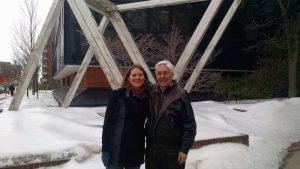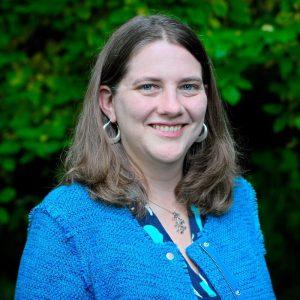
How Harvard Sociologist Sasha Killewald Got Her Start at ISR
May 18, 2022
Contact: Jon Meerdink, [email protected]
ANN ARBOR – Sasha Killewald is pursuing big answers to crucial questions — questions that could change the way we understand the sociology of the family.
How does the amount of money women earn affect the work they do at home? To what extent does the financial success of a person’s parents influence their own financial picture? How are work and money associated with divorce? Her findings have expanded the conversation on these subjects and challenged conventional wisdom in the field.
Killewald began her journey to the top of her field at the University of Michigan, and resources at the Institute for Social Research (ISR) helped springboard her into the career she has today.
Institute for Social research lays the groundwork for career success
After majoring in mathematics, economics, and French as an undergraduate, Killewald turned her attention to training in statistics, sociology, and public policy, leveraging all three through research opportunities at ISR. Through these programs, Killewald developed the research skills she’d ultimately use to publish numerous papers and articles on topics including wealth inequality, gender, and families, an accomplishment made possible thanks to her in-depth training.

Sasha Killewald (left) and her father (right), former acting director of the Center for Political Studies, Chris Achen, outside ISR in 2015.
“Michigan gives you access and training on the statistical models crucial to social research in addition to the guidance you need to think about those models in the right context,” she said.
That guidance proved to be a distinguishing feature, too. Faculty and other researchers during her time at ISR were easy to work with, and she gained experience working with data from landmark studies, including the Panel Study of Income Dynamics and the Health and Retirement Study.
“There are so many datasets being housed at Michigan, and the degree of access to that data is unmatched,” said Killwald. “Plus, the access to faculty and staff experts on those studies is incredible. They’ll reply to grad student emails and offer guidance when asked. That’s a super unique and defining resource.”
The resources and support she received were crucial. Physical space played a big role in how she conducted her research — she enjoyed having her own cubicle — but beyond that, she enjoyed a community filled with events and networking, from coffee and brown bag lunches to professional development classes.
In addition, Killewald’s research received significant funding support, including from the Marshall Weinberg Population Studies Training Program Fund. Generous financial support — including health insurance and other benefits as a graduate student and PhD candidate — allowed her to finish her degree more quickly, rather than having to take time to earn money through teaching or other appointments at the cost of research opportunities.
Life beyond Michigan builds on ISR’s foundation
Killewald completed her PhD in 2011 and from there has continued to make an impact on her field, building on the foundation she laid at ISR. In 2012, with her dissertation advisor, former ISR affiliate Yu Xie, she co-authored her first book, Is American Science in Decline?, an exploration of the academic and popular environments surrounding the sciences in the United States. In 2014, her article Does Specialization Explain Marriage Penalties? (co-authored with Margaret Gough, who she met when both were graduate students in ISR) was named Article of the Year by the Sociology of the Family Section of the American Sociological Association.

Sasha Killewald
In 2012, Killewald joined the Sociology faculty at Harvard University and still works there today, teaching a number of classes while continuing her research on social and economic questions related to the family. She serves as a mentor to graduate students, carrying on ISR’s legacy of building up the next generation of social researchers through careful attention and support for emerging scholars. Killewald is also a member of the scientific advisory board for ISR’s new Wealth and Mobility Study in the Stone Center for Inequality Dynamics.
It’s not a surprise that she’s made an impact beyond Ann Arbor. Of the about two dozen people in her department at Harvard, five have graduate degrees from U-M, each building on their experiences on campus to advance their research in new, exciting ways.
“I encounter so many people in the professional world who received training at ISR,” she said. “It’s such an incredible network of people. ISR is inseparable from how I think about Michigan social sciences.”
